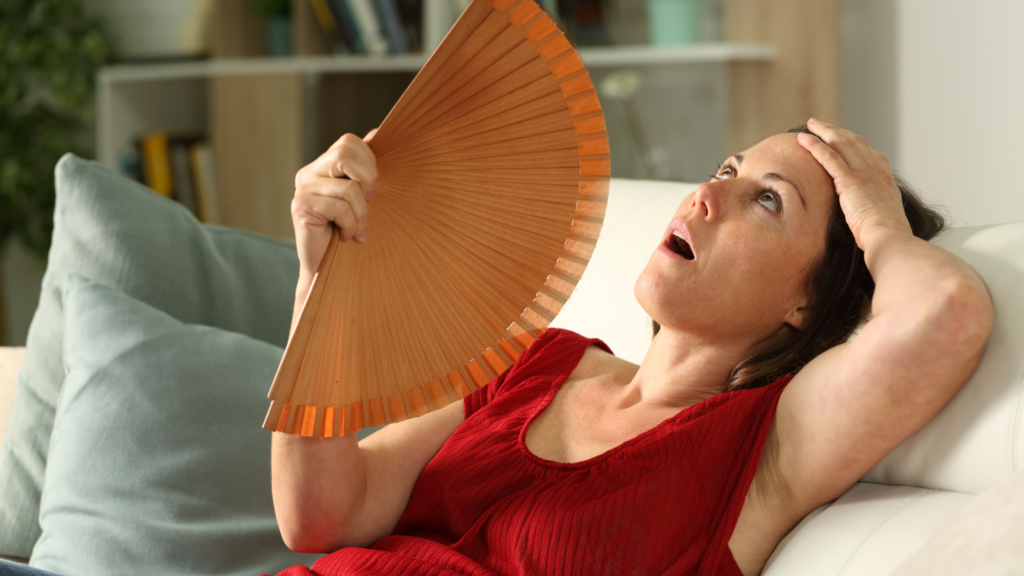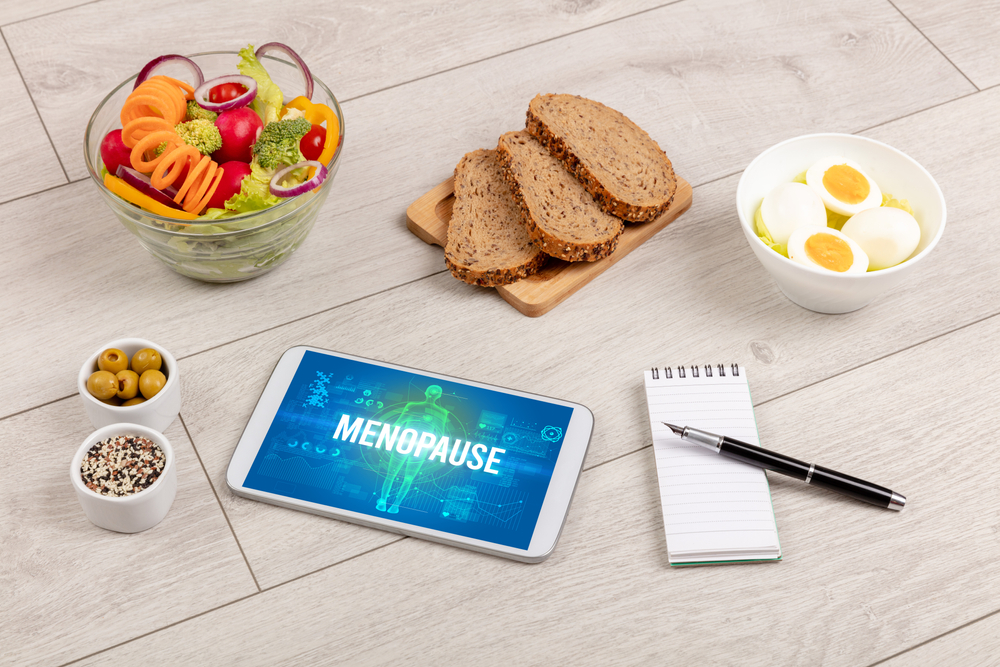Proper nutrition can help with managing menopause from onset through the aging process – check out these tips! Menopause is when your menstrual cycle PAUSEs—for good. It’s not a disease to be treated, but rather a normal stage of life. Menopause “officially” starts 12-months after your last period. That happens, on average, around the age of 51.
This change doesn’t happen overnight, though. There are usually a few years of the menopausal transition, sometimes called “perimenopause.” Perimenopause often starts in the early- to mid-40s. This is when you may start feeling symptoms like:
- Weight gain—especially around the midsection
- Hot flashes and night sweats
- Difficulty sleeping
- Moodiness
- Brain fog

After perimenopause, when menopause officially begins, your risk for heart disease and osteoporosis go up. Why does this even happen? It happens with changing hormones, metabolism, stress levels, and lifestyle. Because your body goes through all these changes, your nutrition needs might also need to be adjusted.
Here are some evidence-based wellness strategies to help navigate managing menopause:
Nutrition tips for managing menopause
1. Drink enough fluids
As you age, you may slowly lose your sense of thirst. This means you can become less hydrated without even noticing it, through no fault of your own. Plus, some key menopausal symptoms may be improved simply by drinking more fluids. Six 8-ounce glasses of water per day can help with hot flashes, night sweats, vaginal dryness, and bladder infections. Ideally, that drink is water or herbal tea. Try some of these hydrating drinks if your tired of plain, old water!
2. Assess alcohol
Alcohol can worsen hot flashes and make it harder to stay asleep. It can also increase your risk of getting or worsening many health conditions. Not to mention it can make you forgetful and confused, and can even lead to loss of muscle mass, balance problems, falls, and accidents. Plus, it has nutrient-free calories that can contribute to weight gain. Try some of these mocktails to replace your evening cocktail.
3. Cut down on spicy foods, caffeine, and sugar
If hot flashes bother you, consider avoiding common triggers like spicy foods and caffeine.
When it comes to sugar, the simplest way to cut down is to replace sugar-sweetened drinks with water or herbal tea. If the thought of cutting out all desserts doesn’t sound fair, try eating smaller portions or even half-sized desserts. A recent study showed that menopausal women who ate more sweets, fats, and snacks suffered from menopausal symptoms more than those who ate more fruits and vegetables.
4. Assess how much you’re eating
Did you know that at 50 years old you need about 200 fewer calories per day than you did during your 30s and 40s? That’s assuming you were a healthy weight and you want to maintain a healthy weight as you get older.
This means that by continuing to eat the same amount of food as you did in your 30s and 40s, you’ll start gaining weight. On average, women in their 50s and 60s gain about 1.5 pounds every year.
If you’re looking to lose weight, we recommend meeting with one of our dietitians. Together, you can evaluate your eating patterns to lose weight in a healthy, sustainable way while maintaining a healthy relationship with food.
Pro Tip: Avoid eating large meals close to bedtime if you have trouble sleeping.
5. Focus on food quality
Eating less food doesn’t mean you need less nutrition, though. That’s why it’s really important to eat quality foods with a lot of nutrients (i.e., nutrient-dense foods). These include fruits, vegetables, and whole grains. When it comes to protein for your muscles and bones, eat legumes, nuts, seeds, fish, and/or poultry.
Studies show that eating a lot of greens decreases typical menopausal symptoms like hot flashes.
By eating more nutrient-dense foods, you’ll get more vitamins, minerals, fiber, and protein which are very important to maintaining your health.
Fun Fact: Your bones love calcium and vitamin D. Some of the richest sources of these are dairy products, fish with bones, and foods fortified with these nutrients (check your labels!). Here are some ideas for helping your body absorb more nutrients!
What about soy and phytoestrogens?
Phytoestrogens are plant compounds that mimic the effects of estrogen in the body. Soy is the best-known phytoestrogen-containing food and can improve hot flashes. You can also find dietary supplements with high amounts of phytoestrogens. Some women choose to take these supplements instead of hormones to manage menopause symptoms.
Research shows inconsistent results when it comes to phytoestrogens for menopausal symptoms. That means some studies show a small reduction in hot flashes, while others don’t.
Before starting any type of supplement, speak with a healthcare professional first.
Final thoughts on managing menopause with nutrition
When it comes to nutrition for menopause a few simple changes can help you navigate menopause.
Be sure to drink enough fluids, but not alcohol; cut down on spicy foods, caffeine, and sugar; eat smaller quantities of higher-quality food; and have soy if you enjoy it.
If menopausal symptoms are bothering you, book an appointment with Melissa B to see how she can help you.

